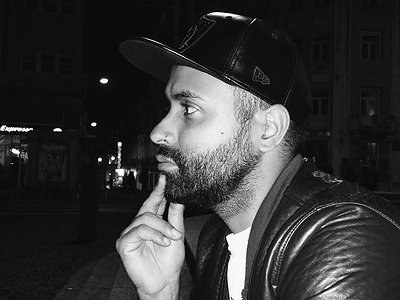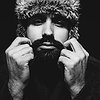Many contemporary production tools already take over significant parts of what would formerly have constituted compositional work. In which way do certain production tools suggest certain approaches, in which way do they limit and/or expand your own creativity? Are there any promising solutions or set-ups capable of triggering new ideas inside of you as a composer?
For me it’s quite a paradox. Your creativity should always dictate how your work will sound. The way you make use of these tools should be in the direction of what you have in mind, serving your purpose as a composer. We can apply this proposition to all musical instruments; samplers; arpeggiators; sequencers and whatnot. Take sampling, for example: you can sample a beat from an old record and use it in the most repetitive, dullest way and build on top of that and still make something interesting, but you can also sample the same beat, chop, slice, slow or speed it (or both at the same time) beyond recognition and make it yours. There’s also the other side of the coin. I recently saw the documentary I Dream of Wires and realized that an excessive amount of possibilities can be overwhelming. Like I said before, there’s beauty in unpredictability, but you must always try to be in control when assembling the final piece. Certains tools are too intuitive to the point that everyone uses them in exactly the same way. Being in control can also mean that you’re not getting out of your comfort zone. You safely operate a tool based on your prior experiences with it. Take a guitar virtuoso, for example: the way he plays his instrument is based on accumulation of practice. That can also lead to a pattern that will influence his compositional work in an uninspired way. In this case he’s not controlling the guitar, but the other way around. I understand why some musicians develop their own compositional methods, because there’s a tendency to stagnate when you’re too comfortable with your instrument. They’re purposely creating "happy accidents". To me the most important thing is how you put all pieces of the puzzle together. In terms of triggering new ideas, I think I would like to explore more instruments I’m not familiar with. I’d like to buy a piano and modify it. As someone who studied classical guitar, I feel formatted. What I think are my creative decisions are perhaps what my teacher thaught me how it should be. Perhaps I’m only reproducing what I learned it is the correct way, and there should be no correct way. Nowdays I’m more inspired in trying new or modified instruments because I feel I can have my own language. That being said, there’s nothing more boring than going to a supposedly experimental gig and watch a bloke trigger sequences in Ableton while performing a few chords in his synth, while a psychedelic video provides the visual component. That’s why I choose not to perform live.
Could you describe your creative process on the basis of a piece or album that's particularly dear to you, please? Where do ideas come from, what do you start with and how do you go about shaping these ideas?
I’ll pick the last sound installation I did (also available as a two part album): Rob Bob Vicar. The idea for this project came to life when I left Portugal for London in 2014 due to the ongoing economic crisis that ravaged my country. I went back to serving as a waiter (a job quite a few struggling artists are acquainted with). During this period I came across some situations that made me realize I was at the bottom of the social pyramid and there was nothing I could do about it. I would have to withstand precarity, psychological bullying and scarcity in exchange of a monthly wage, despite qualifications in Music and Sociology, serving models, actors and rich people who go to their favorite posh place to display wealth and status. While working in this restaurant serving gourmet dishes to rich people, an aversion to food grew - to all it represented. When I returned to Portugal, my girlfriend invited me to make a piece for an exhibition named Plankton she was curating in which several artists presented visceral responses to the universe of food. Soundwise, I used many elements to build this piece: sounds of pigs chewing; posh people having a good time; posh people eating like pigs; chefs talking passionately about their "art"; vlogs of shallow people displaying their night out costumes and so on. All of this was assembled in a way I thought it would reflect my disgust and aversion to food, gradually pinpointing the various reasons. On top of these collages and digital manipulations I composed music pretty much the same way I would do in a film score. There is a progression in which I intend to grab the listeners attention and communicate the same aversion to food, wealth and privilege in the form of sound.
With more and more musicians creating than ever and more and more of these creations being released, what does this mean for you as an artist in terms of originality? What are some of the areas where you currently see the greatest potential for originality and who are some of the artists and communities that you find inspiring in this regard?
The process of recording sound and the concept of a music album is relatively new. Perhaps as a listener, you can clearly set the 70’s from the 80’s or 90’s easily and somehow it’s been established that each decade should bring something new to the table, and in fact, in various musical styles, it did. Apart from pop, the most exciting music being produced was associated with countercultures. It was not only about the music. It was about lifestyle, statement, commitment and dress code. I must confess that I didn’t pay much attention to what happened in the 00’s musically. I was in a time warp of discovering albums released at a time I was still playing with lego, but I remember there was a lot of revival, which is not necessarily a bad thing, because sometimes in order to evolve, one must go back. What I notice is that both musicians and listeners are still coping with the life changing impact of the internet. From a listener’s perspective, it’s overwhelming. There’s just too much information – and sometimes useless noise – when you’re trying to connect with something new. The reasons why you do it are also unclear. The way we consume music nowdays is completely different from what it used to be, but I don’t think it’s a bad thing. There are still niches, countercultures and closed genres, but just as punk was cool when I just heard it, this liquidity and fast pace is equally exciting. Even though I can’t nor won’t listen to 1% of what’s being done. This liquidity is also visible in genre blurring, which is something that has become acceptable and recommendable. The impact of it all will only be understood under a music historian perspective within a few years. Either way, I think we’re living exciting times.
How strictly do you separate improvising and composing?
I don’t. I have Attention Deficit Disorder and I’m not medicated. Most of what I do is improvised. I have a very chaotic way of doing things. When I overdub stuff, the process is pretty much the same. If hit a wrong note during the process, I’ll find a way to delete it and record on top, but when I do film score or sound design work I try a few different things in order to see what sounds better. I improvise most of the time though. The composition part is probably when I assemble everything together.
How do you see the relationship between sound, space and composition and what are some of your strategies and approaches of working with them?
It depends on the project. I did my first sound installation recently and it’s a whole different story to producing records. Due to its ephemerity, I want the listener/observer to respond to the aural/visual stimuli in such a way that the experiences will be carved in the cerebral cortex. This form of communication occurs and fades in minutes and it’s unlikely to be revisited. There are also elements you can’t control. When that happens, I try to make those elements part of the experience. You control sound to a certain extent but space is more unpredictable. Sound travels through the air in the form of vibrations. Space is an empty area that is available to be used and usually contains air. The process of writing a new song or piece is the only thing you fully control. As for strategies... I have none. I do stuff without thinking much about it. If the final result serves the purpose, I’m off to the next thing.




